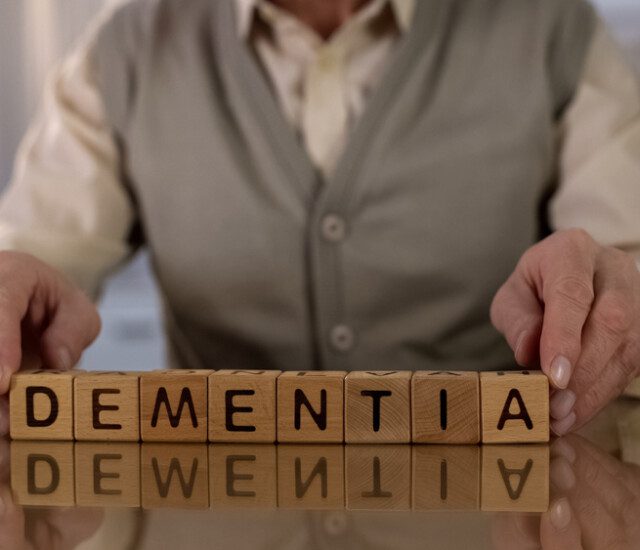With November being Alzheimer’s Awareness Month, it’s a great opportunity to talk about brain health. Given the concerns many older adults have about the risk of developing dementia, here at The Stayton at Museum Way, we believe that part of our role is to provide helpful information on how to have a healthy brain.
What You Do Matters
According to the Alzheimer’s Association, an estimated 12% to 18% of people age 60 or older are living with mild cognitive impairment (MCI), which can be a precursor to Alzheimer’s disease and other forms of dementia.
As the National Council on Aging (NCOA) points out, some memory loss is normal as we get older. It also takes longer for our brains to perform some of the usual functions involved in cognitive processing. Still, these common changes don’t typically interfere with our daily functions to any great extent.
Although genetic factors play a role in who will develop dementia, lifestyle and environmental factors also contribute. These external factors can be modified to help protect a healthy brain and reduce the likelihood of a future dementia diagnosis.
How To Keep Your Brain Healthy
It may come as no surprise to learn that many of the steps you can take to keep your body healthy are also good for your mind. After all, habits that have a protective effect on your heart and circulatory system will help ensure your brain gets the oxygen and nutrients it needs to continue functioning well.
What is good for brain health? The NCOA recommends commonsense efforts such as:
• Eating a balanced diet. Harvard Health recommends including green, leafy vegetables, fatty fish, berries, tea and coffee, and walnuts.
• Exercising. This AARP article suggests trying some combination of aerobic exercise, weight training, yoga, tai chi and dancing.
• Getting enough sleep. Quality is as important as quantity.
• Engaging in activities that are mentally stimulating. See more on this below.
The National Institute on Aging (NIA) suggests taking these additional steps:
• Stay current on recommended health screenings
• Manage chronic health conditions such as high blood pressure and diabetes
• Address any hearing or vision loss you may have
• Limit your use of alcohol
• Quit smoking and avoid other products containing nicotine
• Reduce your risk of falling (and possibly hitting your head) by removing potential hazards from your living environment, such as clutter, throw rugs and electrical cords you might trip over
• Ask your doctor about possible side effects your prescription drugs may have on memory, sleep and brain function
Hearing Loss and Dementia
Research has shown an association between age-related hearing loss and the development of dementia, according to the National Institutes of Health. Fortunately, studies suggest that using hearing aids may help slow the development of cognitive issues.
Activities To Stimulate Your Brain
Staying connected through social activities has many health benefits. Not only can it help prevent loneliness and depression, but it may also support cognitive function, according to the NIA.
Many older adults find that volunteering is an excellent way to stay engaged socially. Along with potentially boosting cognitive health, volunteering has also been shown to give seniors a sense of purpose and enhance their self-worth.
Joining a group in your area (or online) that engages in an activity you enjoy or would like to try is another way to connect with others socially. If there’s a senior center near you, that may be a good place to start looking for groups that interest you.
Mayo Clinic suggests these other activities to challenge your brain:
• Read
• Do crossword puzzles
• Play games
• Try a new hobby (for best results, choose one that involves using your cognitive skills, such as digital photography)
• Learn to play a musical instrument
You might also try learning a new language or enrolling in other types of classes. Community colleges sometimes offer reduced enrollment fees for older adults. Consider looking into online classes or trying an app designed for a specific topic of interest.
How To Improve Brain Health
If you’re experiencing MCI, you may be wondering how to increase brain function — or if that’s even possible.
Dr. Joel Salinas, a neurologist who specializes in treating patients with cognitive decline and impairment resulting from neurodegenerative diseases, says in an article from Harvard Health Publishing that mild cognitive impairment isn’t necessarily permanent, nor does it always progress to dementia.
If the cause of MCI is something that can be treated (for instance, an underlying health condition such as depression) or changed (like switching to a different medication if one you’re taking is causing the MCI), then the symptoms you’re experiencing may be reversible.
The Harvard Health article also notes the American Academy of Neurology has found “encouraging evidence” that links exercise with better memory in those experiencing MCI.
A UCLA Health article cites a study indicating that “even a modest amount of exercise each day” might help delay the onset of more cognitive decline. Participants in the study who began exercising regularly after receiving a diagnosis of MCI saw an 11% decrease in the risk of progressing to dementia when compared with those who never exercised.
Apps Designed To Support Brain Health
You may have heard of brain training apps such as Lumosity and Elevate that are designed to improve cognitive function or memory. If you’re curious and want to try some of them, or if you already have a few favorites, go ahead and have fun. Be aware, though, that the NIA says more evidence is needed to determine how effective they are.
Some of the apps let you compete with other players, so at the very least there’s a social component that could be beneficial. You may want to consider including an app or two as part of a more comprehensive plan to keep your brain stimulated.
A Lifestyle That Promotes Brain Health
The Stayton at Museum Way provides an impressive variety of lifestyle programming residents can choose from to stay physically and mentally invigorated. Options include exercise and yoga classes in our full-service fitness center, lectures in the Sundance multipurpose room, workshops in our art studio and lifelong learning classes.
Best of all, residents have opportunities to socialize throughout the day, every day, whether it’s meeting friends for an expertly prepared meal in one of our dining venues, a walk along a nearby Trinity Trail, a game of cribbage after dinner or dozens of other possibilities.
The Stayton at Museum Way offers independent living and a full continuum of care options. As a resident of the only Life Care Community in the Fort Worth area, you could enjoy the peace of mind that comes from knowing you have access to higher levels of care right here in the community, should you need them later on — and at a predictable, discounted rate.
We invite you to come have a look around to see if our community feels right for you and your future. To arrange a visit, call 817.677.6640 or fill out our short contact form.



